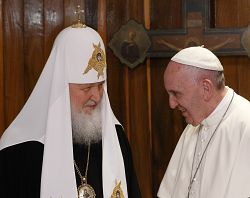A brotherly embrace brings Pope Francis and Russian Orthodox Patriarch Kirill together
Friday, Feb. 19, 2016
 + Enlarge
+ Enlarge
Russian Orthodox Patriarch Kirill of Moscow and Pope Francis meet at Jose Marti International Airport in Havana Feb. 12.
CNS photo/Paul Haring
HAVANA — At long last, Pope Francis and Russian Orthodox Patriarch Kirill of Moscow embraced, kissing each other three times.
“Finally,” the pope told the patriarch Feb. 12 as they met in a lounge at Havana’s Jose Marti International Airport. “We are brothers,” he told the patriarch.
Amid the clicking of cameras and multiple flashes, Patriarch Kirill was overheard telling the pope, “Things are easier now.”
“It is clearer that this is God’s will,” Pope Francis told him.
A flight of almost 12 hours capped months of intense negotiations and more than two decades of Vatican overtures to bring a pope and a Russian patriarch together for the first time.
Cuban President Raul Castro played host to the pope and patriarch, who was on a visit to Russian Orthodox communities on the island-nation. Pope Francis had a pastoral visit to Mexico planned for months; the stop in Havana was announced only a week before the meeting.
Pope Francis and Patriarch Kirill signed a joint declaration that emphasized the things the two churches have in common.
Addressing the situation in the Middle East and North Africa, they said that “whole families, villages and cities of our brothers and sisters in Christ are being completely exterminated.” They called on the international community “to act urgently in order to prevent the further expulsion” of Christians, to end violence and terrorism and to ensure that large amounts of humanitarian aid reach the victims of violence.
“In raising our voice in defense of persecuted Christians, we wish to express our compassion for the suffering experienced by the faithful of other religious traditions who have also become victims of civil war, chaos and terrorist violence,” they said.
“Attempts to justify criminal acts with religious slogans are altogether unacceptable,” they said. “No crime may be committed in God’s name.”
They called those who have died “martyrs of our times” and said they helped unite various churches “by their shared suffering.”
They spoke of the need to be vigilant against European integration that is “devoid of respect for religious identities.” They also spoke of extreme poverty, the “millions of migrants and refugees knocking on the doors of wealthy nations” and consumerism.
They spoke of life issues: abortion, euthanasia, new reproductive technologies and threats against the churches’ view of marriage.
After they signed the document, the two leaders embraced, and each spoke briefly.
Patriarch Kirill said they had a two-hour, “open discussion with full awareness of the responsibility we have for our people, for the future of Christianity, and for the future of human civilization itself. It was a conversation filled with content that gave us the opportunity to understand and hear the position of the other. And the results of the conversation allow me to assure that currently both churches can cooperate together to defend Christians around the world; with full responsibility to work together so that there may be no war; so that human life can be respected in the entire world; so that the foundations of human, family and social morality may be strengthened through the participation of the church in the life of human modern society.”
Pope Francis said: “We spoke as brothers, we share the same baptism, we are bishops, we spoke about our churches. We agreed that unity is done walking (together). We spoke clearly without mincing words. I confess that I felt the consolation of the Spirit in this dialogue. I am grateful for the humility of His Holiness, his fraternal humility and his good wishes for unity. We left with a series of initiatives that I believe are viable and can be done. “
For decades, the Russian Orthodox told the Vatican that a meeting between the patriarch and pope was impossible because of the activities of Latin-rite Catholics in Russia and, especially, the Eastern-rite Catholics in Ukraine.
The Moscow Patriarchate had said that while those problems still exist with the Catholic communities, they take a back seat to the urgency of defending together the rights and very existence of persecuted Christians in the Middle East.
The harsh persecution of Christians and other minorities in Syria, Iraq and other parts of the region has been a cause Pope Francis has pleaded before to world leaders and for which he has rallied the prayers of Christians across the globe.
For questions, comments or to report inaccuracies on the website, please CLICK HERE.
© Copyright 2024 The Diocese of Salt Lake City. All rights reserved.
© Copyright 2024 The Diocese of Salt Lake City. All rights reserved.

Stay Connected With Us